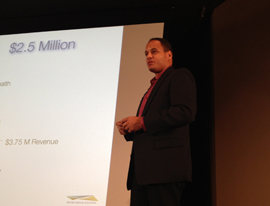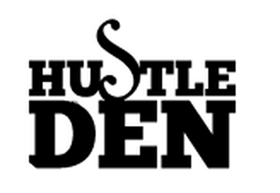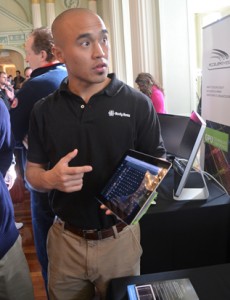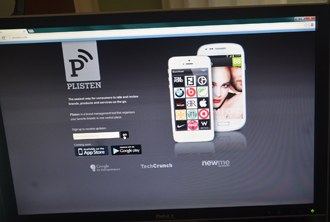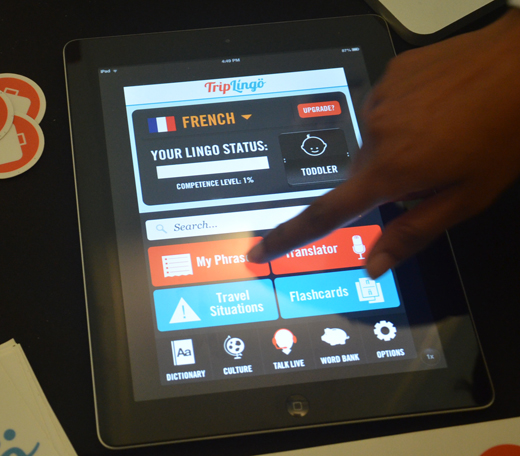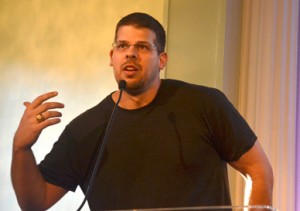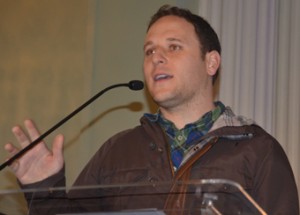 Or if we’d rephrase it, how long would it take before a user would give you a hug because he had a good experience with your app? Why? Besides having a great app in terms of users and success, hugs are less expensive than bandages.
Or if we’d rephrase it, how long would it take before a user would give you a hug because he had a good experience with your app? Why? Besides having a great app in terms of users and success, hugs are less expensive than bandages.
We talked about what mistakes you can make when developing a mobile application. But it would be presumptuous to just point out mistakes. Now we’re going to focus on what you should never loose sight of if you want your mobile app to become the next app rockstar.
We’re going to highlight on what makes an app a great mobile app that people actually like, what can make it a viral app, what features are sine qua non and how it can grow beyond its limitations and get a lot of users patting you on the back.
1. This cannot be stated enough….UX, user experience, la experiencia del usuario, you get the picture
Think about Angry Birds. Yes , I know, everybody keeps beating the drum on how that game took over the world.
Even so, whether intentional or no, it really hit the nail in the head when it came to psychological impact and reasons. Why do people play that game? Let’s analyze it for a moment.
As people, we like to destroy things in games, and it’s no wonder why games in which you throw birds at entrenched nasty pigs ( and scream evilly and cute) would be addictive. The micro-physics in Angry Birds creates a unique user experience each time you catapult those frowny birds into everything. What mobile app mechanic can we learn from this example?
Simply put, when developing an app, create the possibility for the user to customize his own experience as much as possible. If it’s a social app, then let them customize colors, icon sizes, buttons, etc. If you’re gunning for a business app, then you should focus on what content the user deems to be relevant : such as choosing preferences over certain information providers (like newspapers, business blogs, etc.) so they won’t have to check each bit of info one at a time. ”
Make a user feel like he can play with the app in more ways than just tapping a few buttons and closing it. In doing so, you gain a greater level of user engagement and retention. Make it fun and easy or in other words, make creation a part of the user experience. It’s their app at the end of the day and making it feel even more personalized will go a long way for them to remember you.
2. Push notifications = a light tap on your shoulder to improve the day
Push notifications. They can mean anything from alerts, products, offers, updates, beeps, images, anything.
They are essential to the success and survival of a mobile application. From getting certain discounts or new updates on an app, PN’s can remind your users that your app either is still there or that you can ease their day.
For example, a way Foursquare created and maintained user loyalty was through push alerts. When a user was 10 check-ins away from becoming mayor of a certain location, it would provide an incentive to continue using the app.
The key words of push alerts are : targeted, context, geo-points, geo-location, timezones. Unlike ads where often you can shoot blindly and hope for a catch, push notifications mean you know your niche and if you do it right, you’re going to expand it.
3. Contact points, friend invite, developer and customer feedback = visibility and friendliness
In the App Store or Play Store, you’re going to find apps by the bucket. So how exactly is that shiny piece of code you wrote going to attract any attention?
Simple. The user knows who developed it, who published it and what to expect. Reviews are golden. This should be done with simplicity unlike web browsers, where you have to create an account (a uselessly tedious business) to post a comment or a review. A one tap, one touch contact point (i.e. address, mail, phone number, forum) where you tell the developer or the company of that specific app what it’s all about.
Without contact points, the user will feel isolated with his app, which is quite the opposite of what a mobile phone means. Your app philosophy should emulate this concept.
Also, don’t forget about social one touch sharing, like Facebook, where you like the app and want to share it with your friends or invite them. Another useful trait is bug reporting from users. Although the chances of encountering a bug on a mobile app is rarer than a few years ago, it’s a great way to quickly correct mistakes through on time feedback.
4. Social integration – if you want your app to be known it has to support social interaction
People like to talk about their mobile phones, that’s a given. What they can do, how they pay their bills and don’t have to wait in line, how they filmed their cat doing a back flip and so on.
We’re going back to the Angry Birds analogy. So what was one of the leading causes for the proliferation of this game? Social interaction.
Among many other of its traits, one of the things that made the game such an immersive experience was interaction and competition. You could play the game and see the ranking of your friends on Facebook for example. And that really made users want reach the top rankings and use the app more
Gamifying your app is a must. If you make it fun for users then you’ll set the stage for a memorable experience. Monetizing an app is nearly impossible if the app is a headache to use or it’s simply too complex without any reason. It’s all about psychology and the things we tend to remember were those bits of info encapsulated in fun emotions.
Again, it’s about simplicity that has infinite ramifications. One tap sharing and fun comments from users to their social companions is the most powerful form of communication that leads to brand visibility and retention.
,,Extremely useful for understanding user experience : 48 psychological facts you should know”
According to Susan Weinschenk, synchronous activity bonds the group. Your mobile app will be popular if it supports features such as interactive ratings or reviews (either through smart push notifications or an easy to scroll comment bar, either from friends or experts). Buzzword: Interactivity = popularity.
5. Cross-platform compatibility
Or one code to rule them all. It means that a program developed as cross-platform is fully capable of operating on any mobile phone regardless of what operating system that phone is running.
Application development frameworks offer the beauty of code reusability. A magnificent and useful app such as Google Maps would have been a hell to program for one OS at time.
They don’t just cut down development costs and time pressing situations, but they offer the advantage of updating the app as quick as possible. Thus you can ensure you can deliver content /updates to your app faster and users will have higher retention and appreciation. If the app you’re going for is a native one, then having cross platform tools will give you a boost in ensuring fast delivery for updates and changes.
6. If less is more, then great apps mean a dialectic of simple and brilliant implementations
Great mobile apps are very task-focused. A nice analogy would be the classical saying ,,Do you want the short version or the long version of the story?”. With mobile apps the same truth applies. The hardest part in any area is to make something simple.
It’s quite easy and tempting to fall into the mindset of ,,Yeah, we need a button for that, and a scroll for that one, 50 side scrolling screens and so on.” But tablets and smartphones aren’t desktops. Quite the opposite of what people were saying at the dawn of smartphones, which was ,, A computer in the palm of your hand”. It’s a little more than that.
Because the screens are small , you need clear buttons and a precise functionality. Here’s a good example of rules for a clean and simple design.
A stunning app is one that incorporates complex ramifications in a few simple buttons and touches and not dozens of buttons for just one thing. Don’t rush when mulling over complexity and needs. Think about the old military saying. ,,Slow is smooth and smooth is fast”. Just what do we mean with it? Well, the nature of mobile, being on the run and everything. Even though people spend more time on their mobile than on their desktops, one of the reasons for this is clever and fluid simplicity.
7. Analytics are the backbone of where your app is going
Besides finding out how many users actively use your apps, other bits of info can be the turnpoint in knowing what to add or what to cut out in your app. Analytics can be combined with smart push notifications to deliver the most relevant content where it matters and when it matters.
They are also a boon when taking the pulse of in-app purchases and polishing monetization strategies.
The key traits of mobile app analytics are:
- Acquisition and user metrics such as downloads and new user
- Engagement metrics such as retention, crashes and conversions
- Outcome metrics such as app sales and in-app purchases
We could mention other traits a great mobile app should have but that is dependent on the nature of the app itself. QR code scanners are useful in retail and shopping. In-app ads are starting to become a little more refined but then again, this is solely linked to what you want to do with your app and if ads are going to be your main monetization plan. Other things we could highlight would be GPS coupons (repeated visits to a certain place give customers a bonus or discount), loyalty points and promotions.
A viral app has the possibility of creating an online community by itself if it’s done right.
And there we have it. Now these are just the main elements when designing an app that has the possibility of becoming viral. In the end it comes down to basic psychology and user experience. The pivotal features you need to always consider is how your app can spread through social media. To give a soul to an app means to make it interactive and unbound.
And the most coolest trait is that your app will do most of the heavy lifting and actually market itself, leaving you with a lot of monetization options rather than picking a niche and crossing your fingers. Elements such as customer points, badges, in-app money, rewards, they all gamify and create more engagement, fun experience and all round good user reaction.
Unless you’re putting one time apps intentionally, all of these will lead to your own app success story.
This is a guest post by Appscend (http://www.appscend.com) — the all-in-one cross-mobile performance based application platform. Appscend offers its customers the fastest cross platform development technology available on the market today together with a complete list of backend technologies that ensure application & user management, a powerful push notifications platform as well as app analytics, ad-integration, in-app purchases and over-the-air distribution services.



